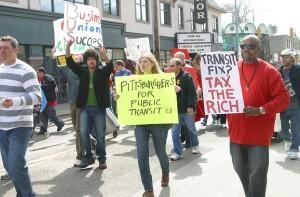by Alicia Wlliamson
 |
| photo by Dawn Jackman-Biery |
Port Authority Transit’s budget comes from a variety of sources at the city, county, state, and federal levels and its levels of funding is inconsistent. PAT has direct control over some financial cost variables like fares, employment and route efficiency, but are operating expenses that they cannot control, such as fuel prices and the rising costs of healthcare. So every time there is a serious budget deficit, PAT responds by increasing fares, cutting service, and laying off workers. All of these measures undermine the mission of public transit.
The state’s effort to fund transportation by putting tolls on Interstate 80 when the federal government ruled that this violated federal law. The I-80 tolling plan was expected to provide more than one-third of PAT’s operating budget. The financial support PAT received from the federal government is determined in part by ridership, so every time PAT cuts service, they also cut their federal funding. The only way to stop the Transit Death Spiral in Allegheny County is to pressure our the county, state and federal governments to make transit a serious priority, and designate an adequate and secure source of funding that we can rely on.